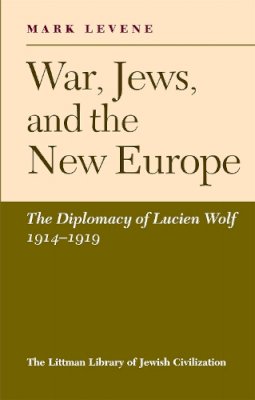
Stock image for illustration purposes only - book cover, edition or condition may vary.
War, Jews, and the New Europe
Mark Levene
€ 44.79
FREE Delivery in Ireland
Description for War, Jews, and the New Europe
Paperback. 'Levene achieves an impressive critical distance from his subject, and this will possibly place his work among the more authoritative interpretations in the long run .. An immensely valuable book.' Michael Berkowitz, AJS Review Num Pages: 368 pages, black & white illustrations. BIC Classification: 1DV; HBJD; HBTB; JFSR1. Category: (UP) Postgraduate, Research & Scholarly. Dimension: 216 x 140 x 20. Weight in Grams: 468.
The First World War was a major watershed in modern Jewish history. Out of it came the Balfour Declaration, a first critical step in the creation of the State of Israel, but also a radical redrafting of the political map of eastern and central Europe, with dramatic and potentially tragic consequences for its dispersed but substantial Jewish minority. In this lucid work, which was awarded the 1991 Fraenkel Prize for Contemporary History, Mark Levene approaches these developments through the diplomatic endeavours of Lucien Wolf, a British Jew who was both one of the chief proponents of the Balfour Declaration and co-architect of the Minorities Treaty that provided an internationally endorsed framework for Jewish existence in Europe after the First World War. Through an analysis of Wolf's diplomacy, Levene examines how Jewish interests throughout Europe were affected by the Great War and how they were perceived by the warring powers. Levene shows how british support for Zionism was bound up with misconceptions about the Jewish role in Europe, notably that the revolutionary movement in Russia was Jewish-inspired and Jewish-led. Equally, however, he shows how the diplomatic activities of Wolf and his Jewish contemporaries heralded the entry of 'world Jewry' as a perceived force in modern politics, and how Wolf himself was preoccupied with eastern Europe and its jews at a precarious time. He also analyses how the war affected Jewish political self-perceptions, reviewing the context between assimilationists and Zionists in the broader framework of war, peace, and international diplomacy. His consideration of their conflicting claims says much that is of relevance to the contemporary discussion of Zionism as well as to the problems of ethnic and religious minorities in nation-states.
Product Details
Format
Paperback
Publication date
2009
Publisher
Liverpool University Press United Kingdom
Number of pages
368
Condition
New
Number of Pages
364
Place of Publication
Oxford, United Kingdom
ISBN
9781906764012
SKU
V9781906764012
Shipping Time
Usually ships in 7 to 11 working days
Ref
99-50
About Mark Levene
Mark Levene is Reader in Comparative History at the University of Southampton and a member of the Parkes Institute for Jewish/non-Jewish Relations. Much of his current work relates to his multi-volume project, Genocide in the Age of the Nation-State, volumes 1 and 2 of which appeared in 2005. He is also concerned with wider environmental issues, most particularly anthropogenic climate change, and is co-founder (with David Cromwell) of Crisis Forum (the Forum for the Study of Crisis in the 21st Century) as well as founder of Rescue!History.
Reviews for War, Jews, and the New Europe
'A book of the first importance and of great originality ... a remarkable achievement.' Max Beloff 'An academic work of immense knowledge and scholarship. It is recommended as a well-written, highly detailed, and accurate assessment of the diplomacy of Lucien Wolf.' Baron Frankal 'Impressive ... has implications well beyond the exploration of one man's diplomatic activity on behalf of British and British-Jewish interests ... Levene demonstrates brilliantly that Wolf was a pragmatist with formidable intellectual resilience ... richly detailed, but most readable work.' David Cesarani, Jewish Chronicle 'Illuminates a critical episode in an unconventional discipline, pre-1948 Jewish diplomatic history. Herein lies the great strength of the book: Levene does not treat his subject like a normative segment of diplomatic history; he is sensitive to the facts that there was no army or government backing up Wolf, and that any impact he might possibly have made must be seen as extraordinary ... Levene achieves an impressive critical distance from his subject, and this will possibly place his work among the more authoritative interpretations in the long run ... superb study ... Levene's research and judgments are meticulous without being pedantic ... an immensely valuable book, which will be of interest to scholars in Anglo-Jewish history, east European Jewish history and politics, Zionist history, diplomatic history, and those interested in the eternally grey zone between peoples, ethnic groups, and publicly recognized nations while the world is crashing down.' Michael Berkowitz, AJS Review 'Substantially documented, suggestive.' Eugene C. Black, Times Literary Supplement
